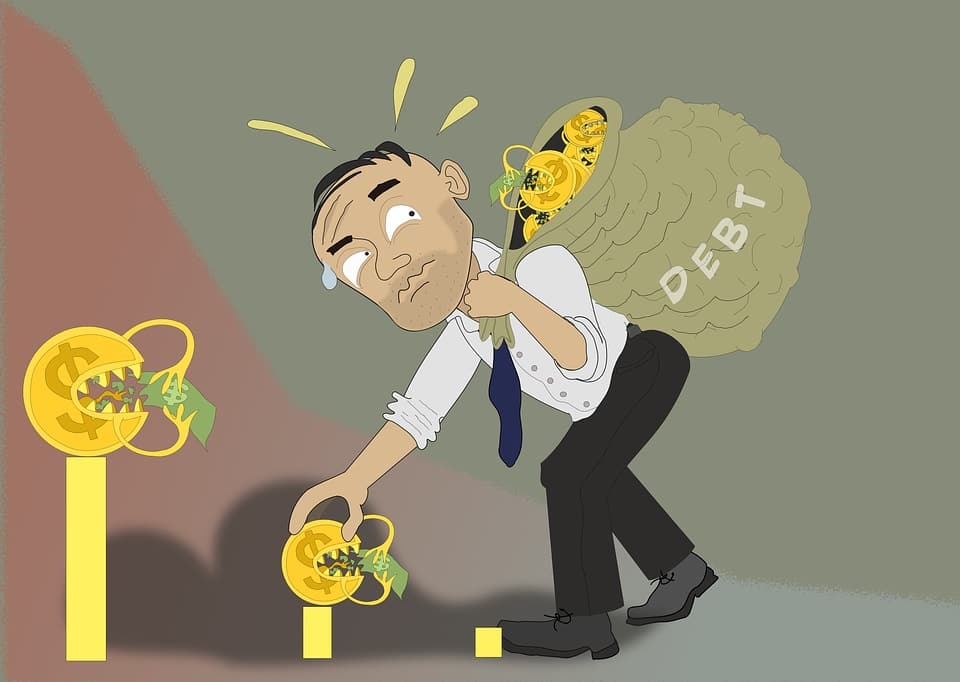
As a blogger whose focus is at least partially on personal finance, I'm often hesitant to touch this topic because it seems so obvious to me. However, since many people struggle with this, and people like Dave Ramsey have made fortunes on telling people out of debt, I suppose I should try to at least tackle the issue at some level, mostly because it's extremely difficult to invest and and build personal wealth when debt when one has debt. Now when I'm talking about debt i'm not referring to your 3-4% interest a year mortgage. That hardly counts, because when one looks at historical stock markets returns it's practically free money, and you should hang onto it for a while, assuming you're willing to invest additional mortgage payments instead. However, if you've already maxed out your tax-free accounts, and the interest rate higher than 4%, it could be arguable something sensible to do. That said, this is a debt post and assumes you're not swimming in money.
The debt i'm referring to is credit card debt, and high interest student loan debt, and any other debt where in interest rate is in excess of 6% a year. While it's always better not to get into this kind of debt in the first place (don't spend money you don't have), in case of student loans it may be somewhat unavoidable. If you're piling on student load debt, I would still recommending working hard during your summers, and being conservative in your spending (the student load isn't free money), even if you'd have loans regardless.
For those with credit card debt, I simply don't understand. I'll say this once: You have a flaming emergency. A credit card works best when you pay it off at the end of every month. It's not some sort of additional bank account you can spend as you wish. If you use it like that, and make only minimum payments, you will find yourself in a world of hurt. This isn't an efficient way to increase your purchasing power, but ensures you pay more in the long run for everything. I'm not sure how to put this more simply. Credit cards will not make up for an income shortfall, but will make the shortfall worse. If you have an income shortfall, the only solution is to make more money or spend less, using a credit cards on exasperate the problem.
I wouldn't even think about making a budget if I had credit card debt. I just try to separate my needs from my wants, and don't buy things I don't need. Needs and wants are easy to separate. It's a need if you can't replace it with a cheaper substitute. New clothing is not a need, a new car is not a need, eating out is not a need, cable is not a need, home internet, computers and iphones are not a need. There are many very functional unlocked smartphones for around $100, and you could access the Internet at the library too. Living on your own is not a need; get a roommate or rent out a room if you have to, or find somewhere cheaper to live. Now, how far you want to take this will depend on your own situation, but regardless of how far, I just want to get into your mind that holding a credit card balance month over month is an emergency situations that you can't just hope to resolve by itself. It's going to take lifestyle changes, sacrifices, because if it didn't, you wouldn't be in debt in the first place. You may also have to take on additional work, whether its a part time job, working overtime hours, or finding a sharing economy gig, like being an Uber driver
After you get a paycheck you should take care of your needs first, by paying your bills you will be required to pay before the next paycheck arrives. Then you should pay off as much as you can on your credit cards, leaving just enough in your bank account to satisfy any needs you expect unfulfilled. Use a debit card to spend for needs, and a credit card only in an emergency. Don't bother trying to have an emergency fund if you still have credit card debt. Even a $1000 emergency fund could cost you $200 a year in interest.
Other options: switching to a credit card with temporarily low fees. Credit card companies will sometimes give you an interest free credit card for a number of months to switch to them. This could save you hundreds if not thousands in interest. Don't treat this as free money, you just bought yourself some time, but you still have an emergency. Watch out for transfer fees though and make sure it's worth it.
Another possibility is to refinance your credit card into your line of credit if you have one, or do some other kind of debt consolidation. While the interest rates are lower, you should have some sort of realistic repayment plan so you don't find yourself in the same situation again.
If you really have problem with the credit card spending, and you can't seem to not abuse it, you may be better off just saving an emergency fund first and cutting up your credit card, (all other steps are the same), even though it's not financially optimal.

 Posted by Jonathan Weyermann on December 6, 2019 at 12:12 AM
Posted by Jonathan Weyermann on December 6, 2019 at 12:12 AM




0 Comments
Add Comment